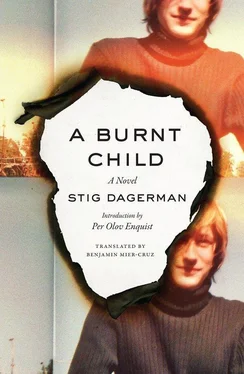What time is it? the son asks.
Ten, the father says as he curls his toes in a hideous way. They eat at eleven. And even though it’s warm inside, Berit is cold.
It is four below zero outside. A skater on sails swooshes across the bay in a flash, like a darting mouse. They drink tea with rum after they eat. Gun lights a candle that she happens to have with her and places it in the center of the table. Then Bengt goes outside for a while and sits down on the steps and smokes. Berit comes out and sits next to him, doodling in the snow with the tips of her boots. The father and stepmother eventually come out, too. Gun is standing at the foot of the stairs and squinting into the sun. She wants to take some photographs. Bengt steps out of the frame.
Why? Gun asks as he takes the camera from her.
He doesn’t answer; he just takes it. He has them stand on the steps and has them look straight ahead for a very long time, but it never turns out well. They are standing either too high or too low. But mostly they stand too far apart from each other.
Squeeze closer together, he says.
His voice is tense, so he can barely say it. But hiding behind the camera, he is able to see how Gun’s eyes try to watch him. For the first time in a long time, she wants to look at him. The camera shakes and he never gets a good shot.
Closer, he says.
Then she puts her arm around the father’s body, around his new dark blue coat. The father puts his around Berit’s black coat. That’s good, Gun whispers.
But it’s not good for her. It’s good enough for Bengt, even though he is shaking. Behind the camera, his eyes are pleased, but he doesn’t want anyone to notice.
Smile, he whispers.
They all hear him, but he said it only to Gun.
Afterward, only the father is smiling. The newlyweds go inside. They have been married for two weeks, and for fifteen days Bengt has been living with Berit. The back of the sofa is fixed, but they still aren’t happy. They were especially unhappy the night the father got married. It was a small wedding, smaller than the father had anticipated. None of his friends came. They must have remembered that the first year of mourning hadn’t quite passed, that there were more than fourteen days left. Fourteen days can be quite a lot of time for acquaintances; besides, it was a Thursday. Only the bridegroom’s sisters came, dressed in Alma’s clothes. They made coffee before the wedding and helped him with his shirt. But Berit was the only one who helped Gun with her dress. They took only one car to and from the courthouse. They ate dinner at the same restaurant, not in a private room though pretty close to the music. The sisters left first; they didn’t have an appetite. Nor did they laugh a single time. They had merely been curious. Actually, the ugly sister did laugh once when the bridegroom dropped the ring as he was putting it on Gun’s finger. She laughed then, but into her glove. The only time she laughs is at the mishaps of others. The only time she’s alive is when someone else dies.
The bridal pair and Bengt and Berit left at the same time but in different directions. The newlyweds took a fancy car, and Bengt and Berit rode the streetcar to Berit’s. She woke up in the middle of the night because Bengt was awake.
Are you asleep? she whispered.
He did not answer. Then she asked:
What are you thinking about?
He lay in endless silence. He was drenched in sweat. Suddenly, he shouted:
Do you know what they looked like?
Who? she whispered. She was afraid, partly because he had yelled and partly because someone might have heard it.
Of course, she knew whom he meant, and he knew that she knew.
Like dogs, he whispered. Like two satisfied little dogs.
Then something compelled her to say:
Why do you love her, Bengt?
As soon as she said it, but not before, she knew it was true. But she didn’t know how she knew it. When Bengt told her that what she had said was a lie, she realized that he was lying, although he was unaware of it then.
I hate her, he whispered.
Then he became fervent and aroused. Fearful of the banjo player and the sleeping card players, she let him take her. When he had fallen asleep, she started to cry in silence. And even though the blankets were thick, she was cold. She knew that the one she loved had spent someone else’s wedding night with her.
But in a sense it is true that he hated. Bengt hasn’t been home for two weeks, nor has he called. One evening the father called him and he wasn’t sober. It’s our honeymoon, you understand, he said. The father sounded happy to be have been left alone. He sounded happy about everything, happy, too, to be drunk. Take Berit and come to the island early tomorrow morning, he said. There’s ice now.
After the picture is taken, Bengt places Berit into the sled, fastens his spike, and pushes her gently into the inlet. He goes around the island three times with her—very slowly at first. The first time, they stop and look back at the island. Smoke is rising from the chimney; it is faint and delicate. The windowpanes are glinting in the dull sun. Heavy and tinged with blue, the snow covers the roof. The father comes out to the porch holding a pail, a shiny pail that he carries very carefully. He empties it over the snow beneath the railing. Now there is a large, ugly patch in the snow. He goes back inside without seeing them.
Nothing like that happens the second time they go around. Nothing happens at all, except that the smoke stops. They also hear a door slam, softly yet distinctly. Then Bengt turns the sled toward the sea. They stand up for a moment and look at the frozen-in ship. There is a granular trench behind it, filled with tall blocks of ice. The ship is deeply submerged and leaning slightly aport. They are too far away to be able to read its name. Ice encrusts the gunwale and the smokestack is frozen in ice, too. The flagpole is holding up a stiff pennant of ice. Next to the ship, there is a dark cloud of men gathered around a black horse and a sled. Its hooves aloft, the horse starts to gallop to shore. A man in a white fur is sitting in the sled, and its ringing bells slide across the ice. The hooves clatter, sometimes hollowly, as if over a bridge.
The third time, the shutter to the cabin is closed. Then he turns very sharply but proceeds very slowly to the island. They sit on the steps for ages before the father unlocks the door and steps outside. He laughs as soon as he sees them. In that moment he looks like a dog. He is more affectionate than ever on his honeymoon, so he takes Berit by the arm, and she goes sledding one more time. Bengt goes inside.
When he enters, Gun hasn’t finished getting dressed. So she quickly wraps a fur around her when she hears him coming. Without touching, they move two chairs in front of the fireplace and feel totally lonesome as they sit there.
Thank you for the letter, Gun says after a while.
The fire is blazing again. In its light, Bengt suddenly sees the dog leash hanging on the damper. He takes it down and hides it in his pocket. The leash shouldn’t hang there, since the dog had been run over on the way to Gun’s brother’s farm.
It wasn’t for you, he answers. The letter was for Papa.
She doesn’t respond but rips off the corner of a newspaper and throws it into the fire. Then she rips off an even bigger piece. Finally, she throws in the entire newspaper. The corners of the house creak in the coldness, and the sun is starting to set. It’s fifteen below. Bengt moves his chair closer to the fire and closer to her, but he knows he can’t get too close. They had promised this to each other after she got married. At the very most, they can get close but never too close. But when they aren’t near each other, Bengt hates her because his tiger roars incessantly into his ear all the things she does when they’re apart. And if it is lying—well, who would dare accuse a tiger of lying?
Читать дальше












